小升初英语必备重点句型
小升初英语必背的句型及词汇归类(最新整理)
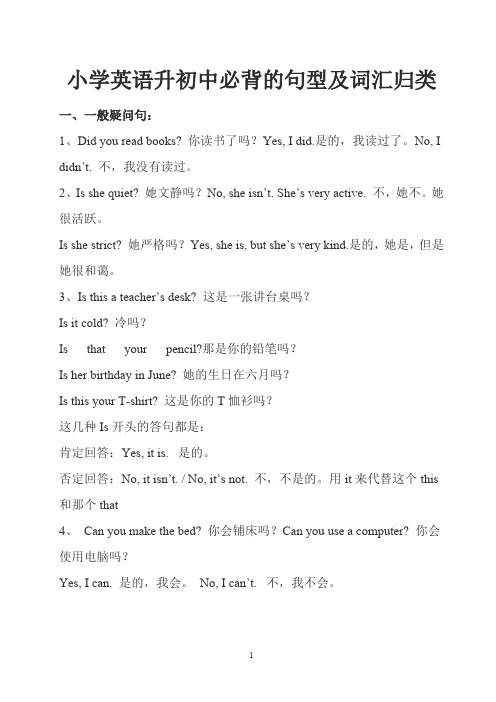
小学英语升初中必背的句型及词汇归类一、一般疑问句:1、Did you read books? 你读书了吗?Yes, I did.是的,我读过了。
No, I didn’t. 不,我没有读过。
2、Is she quiet? 她文静吗?No, she isn’t. She’s very active. 不,她不。
她很活跃。
Is she strict? 她严格吗?Yes, she is, but she’s very kind.是的,她是,但是她很和蔼。
3、Is this a teacher’s desk? 这是一张讲台桌吗?Is it cold? 冷吗?Is that your pencil?那是你的铅笔吗?Is her birthday in June? 她的生日在六月吗?Is this your T-shirt? 这是你的T恤衫吗?这几种Is开头的答句都是:肯定回答:Yes, it is. 是的。
否定回答:No, it isn’t. / No, it’s not. 不,不是的。
用it来代替这个this 和那个that4、Can you make the bed? 你会铺床吗?Can you use a computer? 你会使用电脑吗?Yes, I can. 是的,我会。
No, I can’t. 不,我不会。
5、Are they ducks? 它们是鸭子吗?Are they eating the honey? 它们吃蜂蜜吗?Are those your shoes? 那是你的鞋子吗?Are these your pants? 那是你的裤子吗?这几种句型的回答都是:肯定回答:Yes, they are. 是的,它们是。
否定回答:No, they aren’t. 不,它们不是。
用they来代替这些these和那些those6、Is there a forest in the park? 公园里有一个森林吗?Is there a river?那里有条河吗?Yes, there is. 是的,那里有。
小升初英语常用的62个英语句型
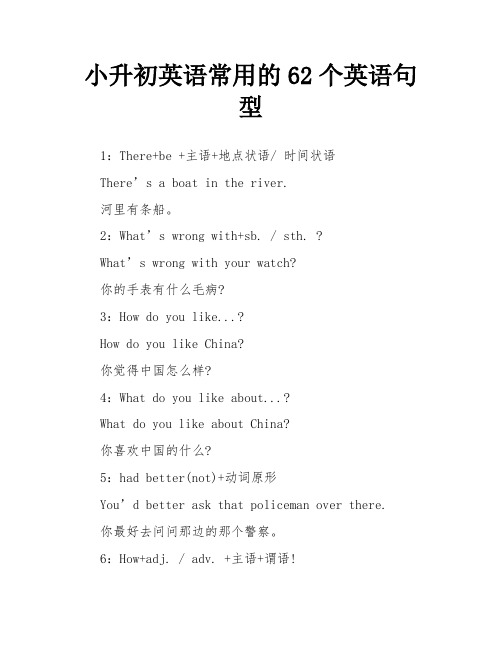
小升初英语常用的62个英语句型1:There+be +主语+地点状语/ 时间状语There’s a boat in the river.河里有条船。
2:What’s wrong with+sb. / sth. ?What’s wrong with your watch?你的手表有什么毛病?3:How do you like...?How do you like China?你觉得中国怎么样?4:What do you like about...?What do you like about China?你喜欢中国的什么?5:had better(not)+动词原形You’d better ask that policeman over there.你最好去问问那边的那个警察。
6:How+adj. / adv. +主语+谓语!What a/ an+adj. +n. +主语+谓语!How cold it is today !今天多冷啊!What a fine picture it is!多美的一幅图画呀!7:Thank+sb. +for(doing)sth.Thank you for ing to see me.感谢你来看我。
8:So+be/ 情态动词/ 助动词+主语He is a student. So am I.他是一个学生,我也是。
9:... not ... until ...He didn’t have supper until his parents came back.直到他的父母回来他才吃饭。
10:比较级+and+比较级The baby cried harder and harder.那孩子哭得越来越厉害。
11:the +比较级,the +比较级The more one has,the more one wants.越有越贪。
12:... as +adj./ adv.+as ...…not as(so) +adj. / adv. +as ...Do you think that art is as important as music?你认为艺术和音乐一样重要吗?Last Sunday the weather was not so wet as it is today.上个星期天的天气不如今天的天气潮湿。
小升初英语常见的9大重点句型
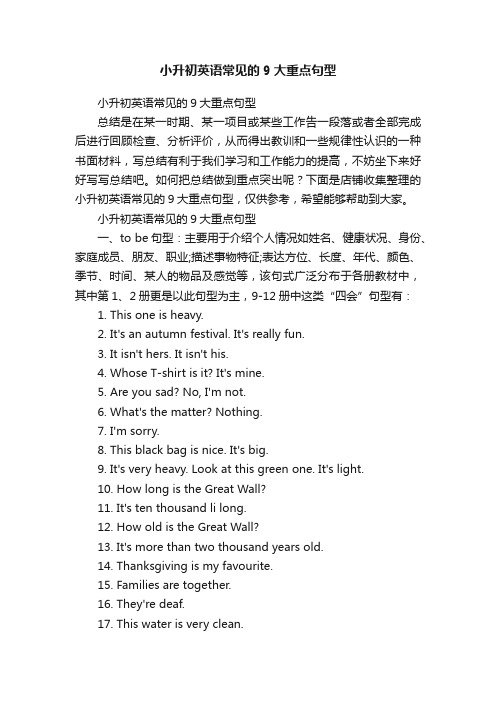
小升初英语常见的9大重点句型小升初英语常见的9大重点句型总结是在某一时期、某一项目或某些工作告一段落或者全部完成后进行回顾检查、分析评价,从而得出教训和一些规律性认识的一种书面材料,写总结有利于我们学习和工作能力的提高,不妨坐下来好好写写总结吧。
如何把总结做到重点突出呢?下面是店铺收集整理的小升初英语常见的9大重点句型,仅供参考,希望能够帮助到大家。
小升初英语常见的9大重点句型一、to be句型:主要用于介绍个人情况如姓名、健康状况、身份、家庭成员、朋友、职业;描述事物特征;表达方位、长度、年代、颜色、季节、时间、某人的物品及感觉等,该句式广泛分布于各册教材中,其中第1、2册更是以此句型为主,9-12册中这类“四会”句型有:1. This one is heavy.2. It's an autumn festival. It's really fun.3. It isn't hers. It isn't his.4. Whose T-shirt is it? It's mine.5. Are you sad? No, I'm not.6. What's the matter? Nothing.7. I'm sorry.8. This black bag is nice. It's big.9. It's very heavy. Look at this green one. It's light.10. How long is the Great Wall?11. It's ten thousand li long.12. How old is the Great Wall?13. It's more than two thousand years old.14. Thanksgiving is my favourite.15. Families are together.16. They're deaf.17. This water is very clean.18. It's fun to drink this way.19. How much is it? It's thirteen dollars and twenty-five cents.20. What's the matter?21. I'm really excited.二、there be句型:包括现在与过去两种,即:there is/are, there was/were。
小升初英文作文常用句型
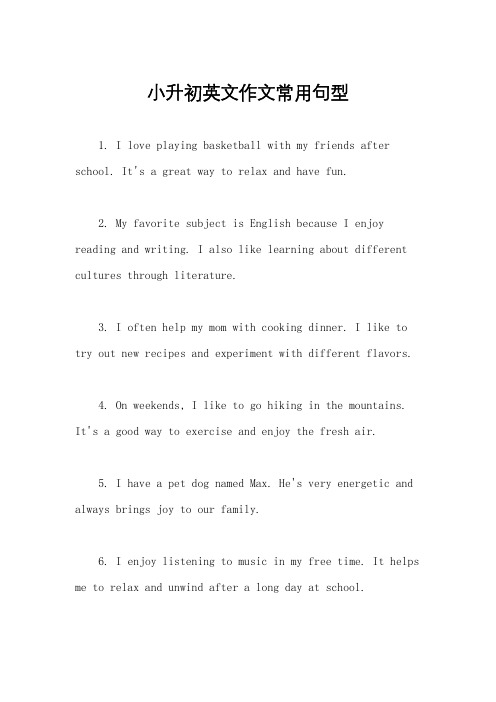
小升初英文作文常用句型1. I love playing basketball with my friends after school. It's a great way to relax and have fun.2. My favorite subject is English because I enjoy reading and writing. I also like learning about different cultures through literature.3. I often help my mom with cooking dinner. I like to try out new recipes and experiment with different flavors.4. On weekends, I like to go hiking in the mountains.It's a good way to exercise and enjoy the fresh air.5. I have a pet dog named Max. He's very energetic and always brings joy to our family.6. I enjoy listening to music in my free time. It helps me to relax and unwind after a long day at school.7. I like to volunteer at the local animal shelter. It's rewarding to help animals in need and make a difference in their lives.8. I enjoy spending time with my grandparents. They always have interesting stories to tell and I learn a lot from them.9. I like to draw and paint in my spare time. It's a creative outlet for me and allows me to express myself.10. I often visit the library to borrow books. I love getting lost in a good story and expanding my knowledge through reading.。
小升初必考英语知识点总结
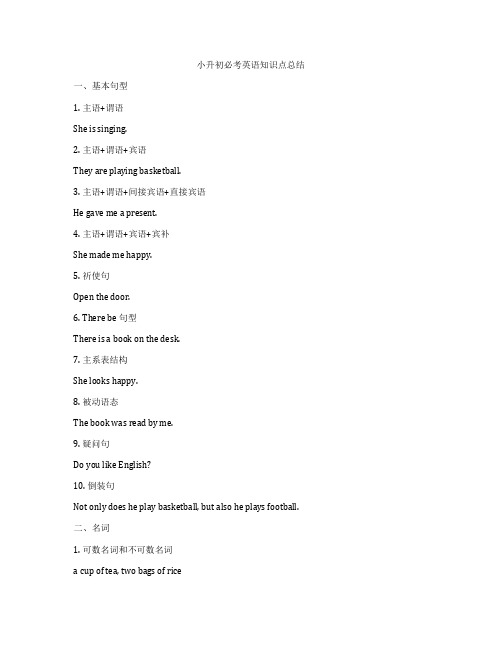
小升初必考英语知识点总结一、基本句型1. 主语+谓语She is singing.2. 主语+谓语+宾语They are playing basketball.3. 主语+谓语+间接宾语+直接宾语He gave me a present.4. 主语+谓语+宾语+宾补She made me happy.5. 祈使句Open the door.6. There be 句型There is a book on the desk.7. 主系表结构She looks happy.8. 被动语态The book was read by me.9. 疑问句Do you like English?10. 倒装句Not only does he play basketball, but also he plays football.二、名词1. 可数名词和不可数名词a cup of tea, two bags of rice2. 名词的所有格my father's car3. 名词的单复数a book, two books4. 特殊名词的复数形式child-children, woman-women5. 特殊名词的不可数名词形式news, information6. 特殊名词的复合名词形式forget-me-not, passer-by三、冠词1. 定冠词和不定冠词a book, the book2. 不加冠词的情况He is a student.3. 特殊用法once upon a time四、代词1. 人称代词I, you, he, she, it, we, they2. 物主代词my, your, his, her, its, our, their3. 反身代词myself, yourself, himself, herself, itself, ourselves, themselves 4. 特殊用法one another, each other五、动词1. 一般现在时He plays basketball every day.2. 一般过去时I played computer games yesterday.3. 一般将来时I will go to the park tomorrow.4. 现在进行时She is reading a book now.5. 过去进行时He was playing basketball at this time yesterday.6. 情态动词can, may, must, should, need7. 动词的不定式to do, to be8. 动词的-ing形式reading, playing9. 动词的完成时I have read that book.10. 动词的被动语态The book was read by me.11. 及物动词和不及物动词I like singing.六、形容词和副词1. 形容词的比较级和最高级big-bigger-biggest2. 副词的用法She sings well.3. 物主形容词my, your, his, her, its, our, their4. 特殊形容词和副词good-better-best, well-better-best七、介词1. in, on, at的用法in the classroom, on the desk, at home2. 特殊介词的用法under, over, between, among3. 介词短语in front of, next to, to the left of4. 介词词组on time, in time八、连词1. and, but, or的用法She likes playing basketball and football.2. because, so的用法He is tired because he works hard.3. 特殊连词的用法either...or, neither...nor, not only...but also...九、数词1. 基数词和序数词one, first2. 特殊数词的用法the first of October, one and a half 3. 特殊用法three times a week, two hours' time十、时间1. 日常时间的表达at seven o'clock, in the morning2. 一般现在时表示的未来情况I leave for Beijing tomorrow.3. 特殊时间状语的用法last Sunday, next Tuesday十一、情态动词1. can, may, must, shouldI can swim.2. 特殊情态动词的用法would like, need3. 特殊用法had better, have to十二、虚拟语气1. if引导的虚拟条件句If I were you, I would go now.2. wish引导的虚拟句I wish I were a bird.3. 特殊用法It's high time, If only十三、疑问句和感叹句1. 一般疑问句Do you like English?2. 特殊疑问句What's your name?3.感叹句What a nice day it is!四、定语和被定语1. 定语的位置和形式the red book, the book on the desk2. 被定语的位置和形式a city of the world, a boy with big eyes3. 特殊用法a cup of tea, the mother of all rivers 十五、主谓一致1. 就近原则Neither she nor I am good at singing.2. 特殊用法There be 句型十六、宾语从句1. 特殊宾语从句的引导词I know who the man is.2. 特殊宾语从句的时态I think he will come soon.十七、主语从句1. 特殊主语从句的引导词What you have said is true.2. 特殊主语从句的时态It's clear that they have won the game. 十八、定语从句1. 特殊定语从句的引导词The boy who is swimming is my friend.2. 特殊定语从句的时态I have lost the pen that you gave me.十九、状语从句1. 时间状语从句When the bell rang, we stopped working.2. 地点状语从句Where there is a will, there is a way.3. 原因状语从句Because he was ill, he didn't go to work.4. 条件状语从句If I were you, I would go now.5. 结果状语从句It's so late that we can't go out.六、语音1. 单词中元音的发音cake, team2. 单词中辅音的发音break, cream3. 单词重读音节的规律beautiful, comfortable4. 特殊音标的发音ai, ee, th七、词汇1. 同义词happy-glad, big-large2. 反义词happy-sad, big-small3. 同音词see-sea, for-four4. 词根act, behave5. 词缀happy-unhappy, Sunday-weekend 8、语法1. 句子成分的转换He doesn't like playing basketball. Playing basketball is not liked by him.2. 句子类型的转换She can swim. - Can she swim?十九、阅读1. 阅读理解阅读短文,回答问题。
小升初句型知识点归纳总结

小升初句型知识点归纳总结一、基本句型1. 主语+谓语例句: Mary sings.翻译: 玛丽唱歌。
2. 主语+谓语+宾语例句: They buy a book.翻译: 他们买了一本书。
3. 主语+谓语+宾语+宾补例句: My father made me happy.翻译: 我父亲使我快乐。
4. 主语+谓语+间宾+直宾例句: She sent me a letter.翻译: 她寄给我一封信。
5. 主语+系动词+表语例句: You are my good friend.翻译: 你是我的好朋友。
6. There be 句型例句: There is a cat on the desk.翻译: 桌子上有一只猫。
7. 含有助动词的句型例句: I can swim.翻译: 我会游泳。
二、疑问句1. 一般疑问句例句: Are you a student?翻译: 你是学生吗?2. 特殊疑问句例句: What’s your name?翻译: 你叫什么名字?三、否定句1. 否定句例句: I don’t like bananas.翻译: 我不喜欢香蕉。
2. 否定意义句例句: He can’t swim.翻译: 他不会游泳。
四、祈使句例句: Close your book.翻译: 关上你的书。
五、感叹句例句: How beautiful the flowers are! 翻译: 这些花多美啊!六、陈述句变疑问句例句: He is a teacher. → Is he a teacher?七、介词短语1. in the morning例句: I get up at 7:00 in the morning. 翻译: 我早上7点起床。
2. at school例句: We have English class at school.翻译: 我们在学校上英语课。
八、对等连接词1. and例句: I like basketball and football.翻译: 我喜欢篮球和足球。
关于小升初英语重点句型知识点复习
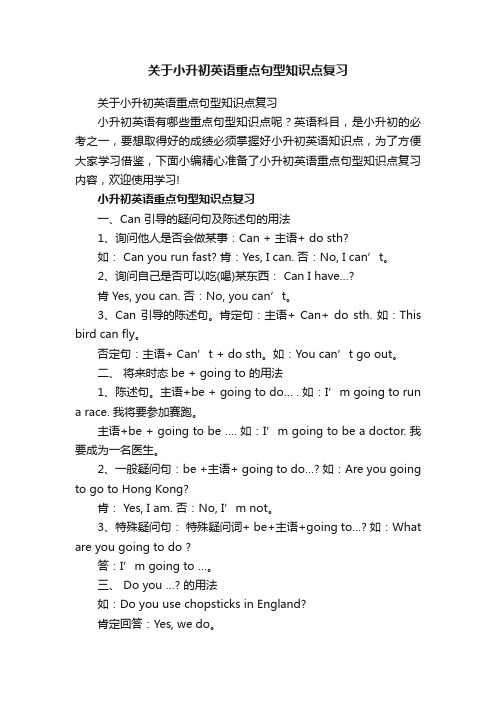
关于小升初英语重点句型知识点复习关于小升初英语重点句型知识点复习小升初英语有哪些重点句型知识点呢?英语科目,是小升初的必考之一,要想取得好的成绩必须掌握好小升初英语知识点,为了方便大家学习借鉴,下面小编精心准备了小升初英语重点句型知识点复习内容,欢迎使用学习!小升初英语重点句型知识点复习一、Can 引导的疑问句及陈述句的用法1、询问他人是否会做某事:Can + 主语+ do sth?如: Can you run fast? 肯:Yes, I can. 否:No, I can’t。
2、询问自己是否可以吃(喝)某东西:Can I have…?肯 Yes, you can. 否:No, you can’t。
3、Can 引导的陈述句。
肯定句:主语+ Can+ do sth. 如:This bird can fly。
否定句:主语+ Can’t + do sth。
如:You can’t go out。
二、将来时态be + going to 的用法1、陈述句。
主语+be + going to do… . 如:I’m going to runa race. 我将要参加赛跑。
主语+be + going to be …. 如:I’m going to be a doctor. 我要成为一名医生。
2、一般疑问句:be +主语+ going to do…? 如:Are you going to go to Hong Kong?肯: Yes, I am. 否:No, I’m not。
3、特殊疑问句:特殊疑问词+ be+主语+going to…? 如:What are you going to do ?答:I’m going to …。
三、Do you …? 的用法如:Do you use chopsticks in England?肯定回答:Yes, we do。
否定回答:No, we don’t。
这个句型是在询问某人是否做某事的'情况下用的,在回答这类疑问句时,注意人称和肯定、否定用法就可以了。
小升初英语必考40个重点知识点
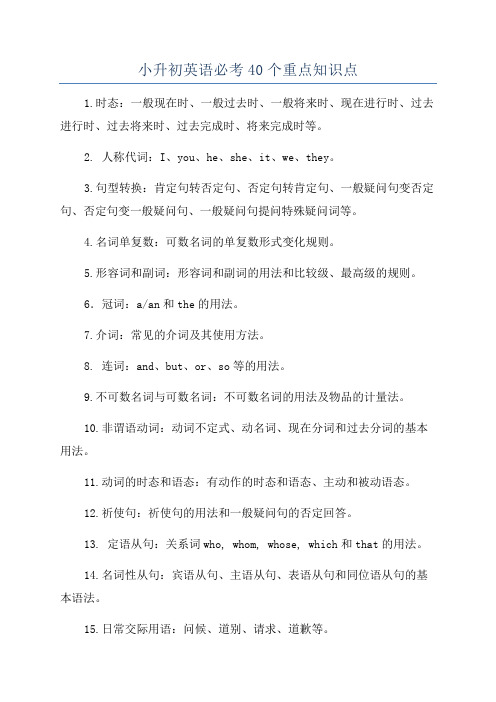
小升初英语必考40个重点知识点1.时态:一般现在时、一般过去时、一般将来时、现在进行时、过去进行时、过去将来时、过去完成时、将来完成时等。
2. 人称代词:I、you、he、she、it、we、they。
3.句型转换:肯定句转否定句、否定句转肯定句、一般疑问句变否定句、否定句变一般疑问句、一般疑问句提问特殊疑问词等。
4.名词单复数:可数名词的单复数形式变化规则。
5.形容词和副词:形容词和副词的用法和比较级、最高级的规则。
6.冠词:a/an和the的用法。
7.介词:常见的介词及其使用方法。
8. 连词:and、but、or、so等的用法。
9.不可数名词与可数名词:不可数名词的用法及物品的计量法。
10.非谓语动词:动词不定式、动名词、现在分词和过去分词的基本用法。
11.动词的时态和语态:有动作的时态和语态、主动和被动语态。
12.祈使句:祈使句的用法和一般疑问句的否定回答。
13. 定语从句:关系词who, whom, whose, which和that的用法。
14.名词性从句:宾语从句、主语从句、表语从句和同位语从句的基本语法。
15.日常交际用语:问候、道别、请求、道歉等。
16.宾语:及物动词后面的宾语和介词后面的宾语。
17.数词:数字和序数词的用法。
18.频率副词:频率副词的位置和用法。
19. 情态动词:can、could、may、might等的用法。
20.反意疑问句:反意疑问句的构成和回答方式。
21.祈使句和陈述句的句型转换。
22.简单句和复合句的句型转换。
23.状语从句:时间、地点、方式等状语从句的用法。
24.英语字母和大小写的用法规则。
25.数字和时间的表达方法。
26.祈使句、感叹句和陈述句的区别。
27.人称代词和形容词性物主代词的用法。
28.祈使句的否定形式的构成和用法。
29.独立主格结构:独立主格结构的基本句型和用法。
30.定语从句和名词性从句的结构和区别。
31.特殊疑问句:特殊疑问句的基本用法和回答方式。
小升初英语重点知识点总结
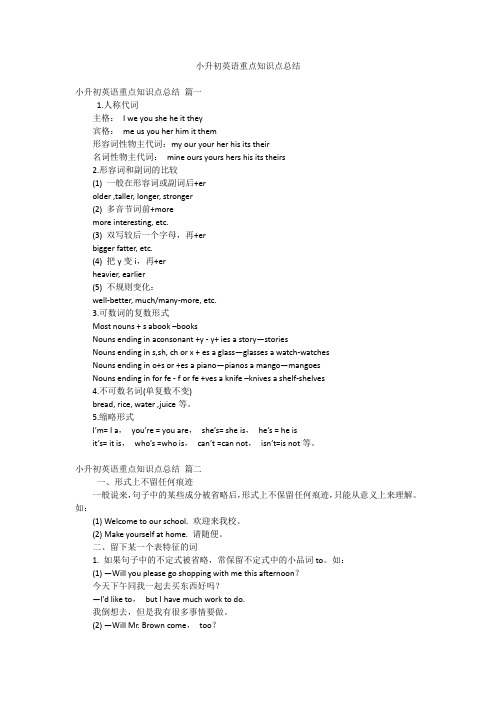
小升初英语重点知识点总结小升初英语重点知识点总结篇一1.人称代词主格:I we you she he it they宾格:me us you her him it them形容词性物主代词:my our your her his its their名词性物主代词:mine ours yours hers his its theirs2.形容词和副词的比较(1) 一般在形容词或副词后+erolder ,taller, longer, stronger(2) 多音节词前+moremore interesting, etc.(3) 双写较后一个字母,再+erbigger fatter, etc.(4) 把y变i,再+erheavier, earlier(5) 不规则变化:well-better, much/many-more, etc.3.可数词的复数形式Most nouns + s abook –booksNouns ending in aconsonant +y - y+ ies a story—storiesNouns ending in s,sh, ch or x + es a glass—glasses a watch-watchesNouns ending in o+s or +es a piano—pianos a mango—mangoesNouns ending in for fe - f or fe +ves a knife –knives a shelf-shelves4.不可数名词(单复数不变)bread, rice, water ,juice等。
5.缩略形式I’m= I a,you’re = you are,she’s= she is,he’s = he isit’s= it is,who’s =who is,can’t =can not,isn’t=is not等。
小升初英语重点知识点总结篇二一、形式上不留任何痕迹一般说来,句子中的某些成分被省略后,形式上不保留任何痕迹,只能从意义上来理解。
小升初英语常考句型汇总
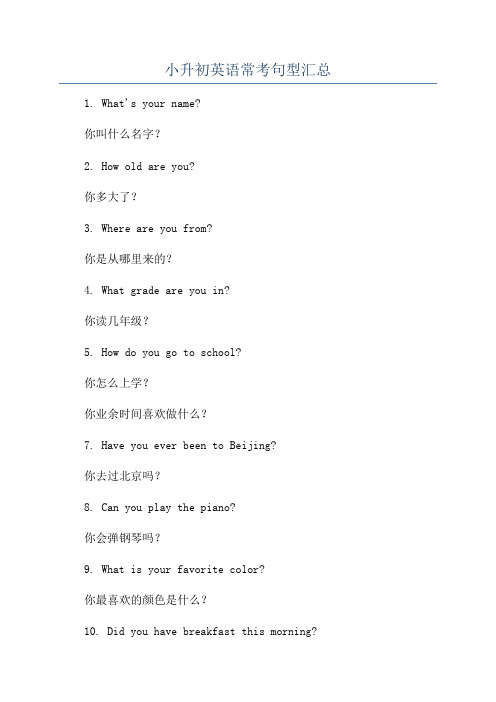
小升初英语常考句型汇总1. What's your name?你叫什么名字?2. How old are you?你多大了?3. Where are you from?你是从哪里来的?4. What grade are you in?你读几年级?5. How do you go to school?你怎么上学?你业余时间喜欢做什么?7. Have you ever been to Beijing?你去过北京吗?8. Can you play the piano?你会弹钢琴吗?9. What is your favorite color?你最喜欢的颜色是什么?10. Did you have breakfast this morning?你今天早上吃早餐了吗?你通常什么时候睡觉?12. How many brothers and sisters do you have?你有几个兄弟姐妹?13. What is your favorite subject?你最喜欢的科目是什么?14. Do you like reading books?你喜欢读书吗?15. What do you want to be when you grow up?你长大后想成为什么?16. Where is your hometown?你的家乡在哪里?17. What did you do last weekend?你上周末做了什么?18. Can you speak English?你会说英语吗?19. How long have you been studying English?你学英语多长时间了?20. What is your favorite food?你最喜欢的食物是什么?。
小升初英语最常考的八大句型
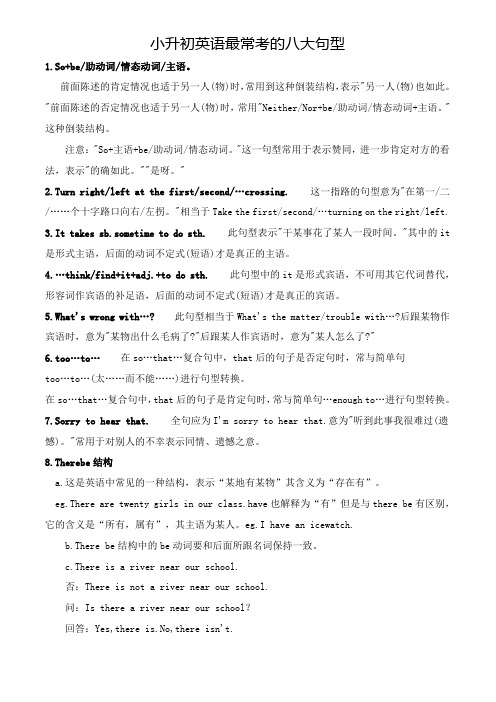
小升初英语最常考的八大句型1.So+be/助动词/情态动词/主语。
前面陈述的肯定情况也适于另一人(物)时,常用到这种倒装结构,表示"另一人(物)也如此。
"前面陈述的否定情况也适于另一人(物)时,常用"Neither/Nor+be/助动词/情态动词+主语。
"这种倒装结构。
注意:"So+主语+be/助动词/情态动词。
"这一句型常用于表示赞同,进一步肯定对方的看法,表示"的确如此。
""是呀。
"2.Turn right/left at the first/second/…crossing.这一指路的句型意为"在第一/二/……个十字路口向右/左拐。
"相当于Take the first/second/…turning on the right/left.3.It takes sb.sometime to do sth.此句型表示"干某事花了某人一段时间。
"其中的it 是形式主语,后面的动词不定式(短语)才是真正的主语。
4.…think/find+it+adj.+to do sth.此句型中的it是形式宾语,不可用其它代词替代,形容词作宾语的补足语,后面的动词不定式(短语)才是真正的宾语。
5.What's wrong with…?此句型相当于What's the matter/trouble with…?后跟某物作宾语时,意为"某物出什么毛病了?"后跟某人作宾语时,意为"某人怎么了?"6.too…to…在so…that…复合句中,that后的句子是否定句时,常与简单句too…to…(太……而不能……)进行句型转换。
在so…that…复合句中,that后的句子是肯定句时,常与简单句…enough to…进行句型转换。
7.Sorry to hear that.全句应为I'm sorry to hear that.意为"听到此事我很难过(遗憾)。
2023 小升初 重点句型 六年级英语上册全册句型 过关(人教pep版)

2023 小升初重点句型六年级英语上册全册句型过关(pep人教版)Unit 1中译英1.博物馆的商店在哪儿?2.在大门附近。
3. 我们怎么到那儿?4. 到书店左转。
Unit 21.你怎么来学校的?2.通常我走路来。
3.在美国骑自行车的人必须戴(头盔)。
4. 别闯红灯!5.我必须注意交通信号灯!Unit 31. 你明天打算做什么?2.我要上美术课。
3.我们要到人民公园去画画。
4.你们打算去哪儿?5.我们打算去电影院。
6. 你们什么时候去?Unit 41.彼得有什么爱好?2. 他喜欢读故事。
3. 他住在悉尼吗?4.不,他没有。
5. 他喜欢猜字谜和远足吗?6.是的,他喜欢。
Unit 51.他是做什么的?2. 他是商人。
3. 他在哪儿工作?4. 他在海上工作。
5. 他怎么上班?6.他骑自行车上班。
Unit 61.他们害怕他。
2.猫(警察)很生他们的气。
3. 怎么了?4. 你爸爸病了。
5.他今天早上应该去看病。
6.别伤心。
英译中Unit 11.Where is the museum shop?2.It’s near the door.3.How can we get there?4.Turn left at the bookstore.Unit 21.How do you come to school?ually, I come on foot.3.In the USA people on bikes must wear one.4. Don’t go at the red light!5.I must pay attention to the traffic lights!Unit 31.What are you going to do tomorrow?2.I’m going to have an art lesson.3.We’re going to draw some pictures in Renmin Park.4.Where are you going?5.We’re going to the cinema.6.When are you going?Unit 41.What are Peter’s hobbies?2.He likes reading stories.3. Does he live in Sydney?4.No, he doesn’t.5.Does he like doing word puzzles and going hiking?6.Yes, he does.Unit 51.What does he do?2. He’s a businessman.3. Where does he work?4.He works at sea.5.How does he go to work?6.He goes to work by bike.Unit 61.They’re afraid of him.2.The cat is angry with them.3. What’s wrong?4.Your father is ill.5.He should see a doctor this morning.6.Don’t be sad.参考答案Unit 11.Where is the museum shop? 博物馆的商店在哪儿?2.It’s near the door. 在大门附近。
小升初英语复习重点汇总

小升初英语复习重点汇总小升初英语复习重点汇总学好初中的英语知识,可以为将来高中英语的学习打下结实的基础,减少学习负担。
下面是小编为大家整理的小升初英语复习重点,欢迎阅读,希望对大家有所帮助。
小升初英语复习重点1:主要不定代词的用法:(1)one的用法A. one作为代词可以指人,也可以指物。
B. one,ones (one的复数形式) 可用来代替前面出现过的少数名词,以避免重复。
C. one的前面可用this,that,the,which等词来修饰。
D. 常有a+形容词+one这一形式。
it和one的用法区别:it用来指特定的东西,而one则用于替代不特定的东西。
(2)some和any的用法区别A. some,any可与单、复数可数名词和不可数名词连用。
some 一般用于肯定句,any一般用于否定句,疑问句和条件句中。
B. some,any与—thing,—body,—one构成的合成词的用法与some,any一样。
C.在疑问句中,一般不用some,只有当问句表示一种邀请或者请求,或期待一个肯定的回答时才能用some。
D. some在否定句中表示半否定,any表示全否定。
E.some用于单数可数名词前,表示“某个”而不是“一些”。
(3)other,another的用法数种类单数复数泛指another=an otherother (boys)others特指the otherthe other (boys) the others 功能作主语、宾语、定语作定语作主语、宾语 A. another=anotherI want to have another two cakes.我想再吃两个蛋糕。
B.the other表示两个中的另一个,常与one连用。
常见形式是“one...the other...”。
C. other+复数名词=othersD. the other+复数名词=the others(4) a11、both的用法 both表示“两者都……”,而a11表示“三个或三个以上的人或物都……”。
小升初英语70个必背重点句型
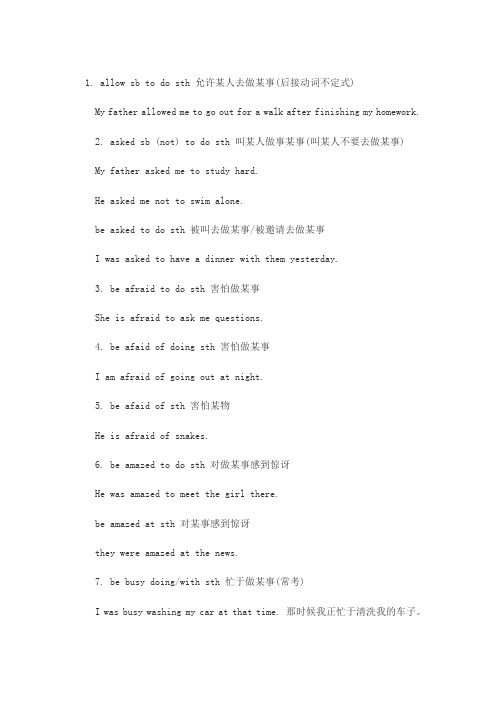
1. allow sb to do sth 允许某人去做某事(后接动词不定式)My father allowed me to go out for a walk after finishing my homework.2. asked sb (not) to do sth 叫某人做事某事(叫某人不要去做某事)My father asked me to study hard.He asked me not to swim alone.be asked to do sth 被叫去做某事/被邀请去做某事I was asked to have a dinner with them yesterday.3. be afraid to do sth 害怕做某事She is afraid to ask me questions.4. be afaid of doing sth 害怕做某事I am afraid of going out at night.5. be afaid of sth 害怕某物He is afraid of snakes.6. be amazed to do sth 对做某事感到惊讶He was amazed to meet the girl there.be amazed at sth 对某事感到惊讶they were amazed at the news.7. be busy doing/with sth 忙于做某事(常考)I was busy washing my car at that time. 那时候我正忙于清洗我的车子。
I am busy with my work.8. becoming/going/leaving/fiying/moving/dying(某些位移动词用进行时态时表将来)the bus is coming/the dog is dying.9. be excited to do sth 对做……感到兴奋Jacky was excited to travel there by plane.be excited at sthLily was excited at his words.be excited about doing sthhe was excited about passing the exam without going overing books.10. be frightened to do sth 害怕去做某事Sam is frightened to ride a horse.11. be glad/happy to do sth 高兴去做某事She is happy to clean theblackboard with me.be pleased to do sth高兴做某事She was pleased to helpthe old man yesterday.be pleased with sth 对某事感到高兴/满意The teacher was pleasedwith my answer.12.be interested in sth/doing sth 对某事感兴趣/对做某事感兴趣She is interested inswimming in the river.My btother is interestedin Chinese.13. be/get ready for/to do sthbe ready for 为某事做好了准备We are ready for the exam.Be ready to do sth 为做某事做好了准备We are ready to have a birthday party for her.get ready for sth为某事在做准备We are getting ready for the exam.14. be surprised to do sth 对做某事感到惊奇be surprised at sth 对某事感到惊奇This is nothing to be surprised at.I'd be surprised to see him on such an occasion.15. be worth doing sth 值得做某事(worth 后接动词-ing形式,常考) It was too remote to be worth thinking about.16. 开始去做某事begin to do sth begin/start to do/doing sth When do children begin to go to school?17. can/be able to afford (to buy) sth 有能力负担(购买)……At this rate we won't be able to afford a holiday.18. can/may/must do sth could/would/should/might do sthWe may come at another time.19. can't wait todo sth 迫不急待地去做某事I can’t wait to hear the news.20. decide to do sth 决定去做某事make up one's mind to do sth 下决心去做某事(常考) make a decision to do sth 对做某事作出决定What do they decide to do?I have made up my mind to go with him21. deserve to do sth 值得/应该做……We must admit that she did deserve to win.22. encourage sb to do sth 鼓励某人去做某事Encourage them to do some other helpful recreations.23. enjoy doing sth 喜欢去做某事I enjoy reading the story book24. expect (sb) to do sth 期望去做某事Don't expect him to help you.25. fail to do sth 做某事失败succeed doing sth 成功做了某事If you don' t work, you willfail to pass the exam. 26. finish doing sth 做完某事(后接动词-ing形式)(常考) After finish doing your homework, you can have a rest.27. follow sb to do sth 跟随某人去做某事Follow me to read the new words.28. get sb to do sth / make sb do sth/ let sb do st 让某人做某事(后接动词原形)Her jokes made us laugh.29. get/have a chance to do sth 得到一个做某事的机会I'm very happy to have a chance to visit your school.30. give/pass/show/lend/sell sb sth/sth to sbbuy/get/bring sb sth/sth for sbPlease give me a piece of paper.I bought him a drink in return for his help.31. go on to do sth /go on doing sth 继续做事(常考)Go on doing the exercise after a short rest.32. hate to do/doing sth 讨厌/不喜欢做某事Ihate to tell the news to you.33. have fun doing sth 做某事很有趣Have fun getting to know each other.34. have problems doing sth 做某事遇到困难Many people have problems getting to sleep at night.35. have sb do sth/have sth done 让某人做某事This is the best work you have ever done.36. hear sb do sth 听到某人做某事(后接动词原形,常考) hear sb doing sth 听到某人正在做某事(常见)I heard someone laughing.37. help to do sth 帮忙做某事help sb (to) do sth 帮助某人做某事I'll help you clean the room.38. hope/wish to do sth 希望做某事wish sb to do sth 希望某人做某事I wish to take this opportunity to thank you all.39. It seems that 这像是……(后接从句)seem to do sthseem +adjIt'seems that you are lying.Does that seem to make sense?40. It's + adj+(for sb) to do sth .It's+adj +(of sb) to do sthIt's glad for him to hear the news.1. allow sb to do sth 允许某人去做某事(后接动词不定式)My father allowed me to go out for a walk after finishing my homework.2. asked sb (not) to do sth 叫某人做事某事(叫某人不要去做某事)My father asked me to study hard.He asked me not to swim alone.be asked to do sth 被叫去做某事/被邀请去做某事I was asked to have a dinner with them yesterday.3. be afraid to do sth 害怕做某事She is afraid to ask me questions.4. be afaid of doing sth 害怕做某事I am afraid of going out at night.5. be afaid of sth 害怕某物He is afraid of snakes.6. be amazed to do sth 对做某事感到惊讶He was amazed to meet the girl there.be amazed at sth 对某事感到惊讶they were amazed at the news.7. be busy doing/with sth 忙于做某事(常考)I was busy washing my car at that time. 那时候我正忙于清洗我的车子。
小升初英语考试十个常考句型知识点

小升初英语考试十个常考句型知识点2014-10-06呼市小升初那点事儿小升初,英语有哪些常考的知识点“以下整理的十个常考的知识点,希望对同学们有帮助。
1.动词be(is,am,are)的用法 我(I)用am, 你(you)用are,is跟着他(he),她(she),它(it)。
单数名词用is,复数名词全用are。
变否认,更容易,be后not加上去。
变疑问,往前提,句末问号莫丢弃。
还有一条须注意,句首大写莫忘记。
2.this,that和it用法(1)this和that是指示代词,it是人称代词。
(2)距离说话人近的人或物用this, 距离说话人远的人或物用that。
如: This is a flower. 这是一朵花。
(近处)That is a tree. 那是一棵树。
(远处)(3)放在一起的两样东西,先说this, 后说that。
如:This is a pen. That is a pencil. 这是一支钢笔。
那是一支铅笔。
(4)向别人介绍*人时说This is…, 不说That is…。
如:This is Helen. Helen, this is Tom. 这是海伦,海伦,这是汤姆。
(5)This is 不能缩写, 而That is可以缩写。
如:This is a bike. That’s a car. 这是一辆自行车。
那是一辆轿车。
(6)打时,介绍自己用this, 询问对方用that。
如:-Hello! Is that Miss Green“喂,是格林小姐吗“-Yes, this is. Who’s that“是的,我是,你是谁“ 注意:虽然汉语中使用“我〞和“你〞,但英语中打时绝不可以说:I am…, Are you…“/Who are you“(7)在答复this或that作主语的疑问句时, 要用it代替this或that。
如:①-Is this a notebook“这是笔记本吗“-Yes, it is. 是的,它是。
小升初英语经典语法总结(8篇)
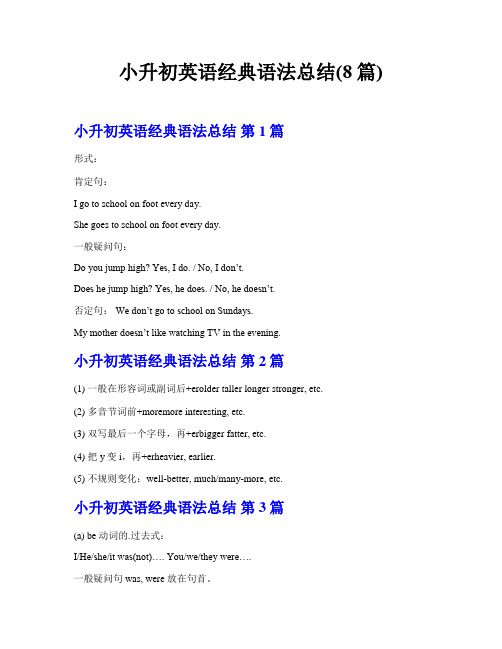
小升初英语经典语法总结(8篇)小升初英语经典语法总结第1篇形式:肯定句:I go to school on foot every day.She goes to school on foot every day.一般疑问句:Do you jump high? Yes, I do. / No, I don’t.Does he jump high? Yes, he does. / No, he doesn’t.否定句:We don’t go to school on Sundays.My mother doesn’t like watching TV in the evening.小升初英语经典语法总结第2篇(1) 一般在形容词或副词后+erolder taller longer stronger, etc.(2) 多音节词前+moremore interesting, etc.(3) 双写最后一个字母,再+erbigger fatter, etc.(4) 把y变i,再+erheavier, earlier.(5) 不规则变化:well-better, much/many-more, etc.小升初英语经典语法总结第3篇(a) be 动词的.过去式:I/He/she/it was(not)…. You/we/they were….一般疑问句was, were 放在句首。
(b) 动词过去式:肯定句: I watched cartoons.She visited the zoo.一般疑问句:Did you read book last night? Yes, I did. No, I didn’t. Did she clean the desk just now? Yes, she did. No, she didn’t.否定句:They didn’t go the the part yesterday.He didn’t make model ships last week.(3)动词过去式的变化:规则动词的变化:Most verbs +ed eg. planted,watered,climbed。
小升初英语重点语法和句型
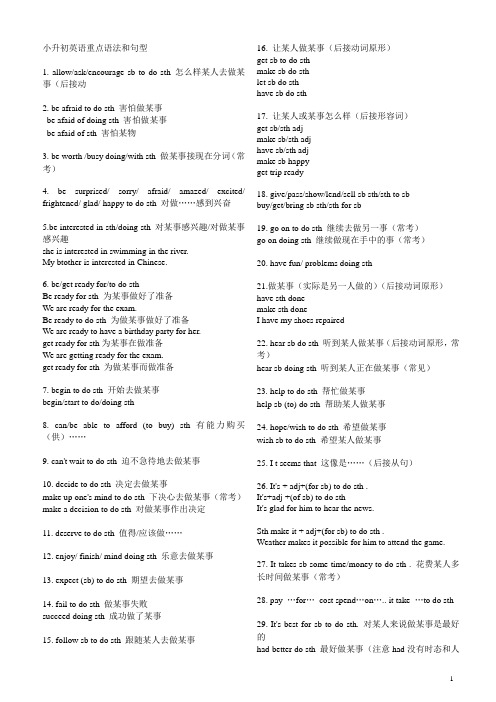
小升初英语重点语法和句型1. allow/ask/encourage sb to do sth 怎么样某人去做某事(后接动2. be afraid to do sth 害怕做某事be afaid of doing sth 害怕做某事be afaid of sth 害怕某物3. be worth /busy doing/with sth 做某事接现在分词(常考)4. be surprised/ sorry/ afraid/ amazed/ excited/ frightened/ glad/ happy to do sth 对做……感到兴奋5.be interested in sth/doing sth 对某事感兴趣/对做某事感兴趣she is interested in swimming in the river.My btother is interested in Chinese.6. be/get ready for/to do sthBe ready for sth 为某事做好了准备We are ready for the exam.Be ready to do sth 为做某事做好了准备We are ready to have a birthday party for her.get ready for sth为某事在做准备We are getting ready for the exam.get ready for sth 为做某事而做准备7. begin to do sth 开始去做某事begin/start to do/doing sth8. can/be able to afford (to buy) sth 有能力购买(供)……9. can't wait to do sth 迫不急待地去做某事10. decide to do sth 决定去做某事make up one's mind to do sth 下决心去做某事(常考)make a decision to do sth 对做某事作出决定11. deserve to do sth 值得/应该做……12. enjoy/ finish/ mind doing sth 乐意去做某事13. expect (sb) to do sth 期望去做某事14. fail to do sth 做某事失败succeed doing sth 成功做了某事15. follow sb to do sth 跟随某人去做某事16. 让某人做某事(后接动词原形)get sb to do sthmake sb do sthlet sb do sthhave sb do sth17. 让某人或某事怎么样(后接形容词)get sb/sth adjmake sb/sth adjhave sb/sth adjmake sb happyget trip ready18. give/pass/show/lend/sell sb sth/sth to sbbuy/get/bring sb sth/sth for sb19. go on to do sth 继续去做另一事(常考)go on doing sth 继续做现在手中的事(常考)20. have fun/ problems doing sth21.做某事(实际是另一人做的)(后接动词原形)have sth donemake sth doneI have my shoes repaired22. hear sb do sth 听到某人做某事(后接动词原形,常考)hear sb doing sth 听到某人正在做某事(常见)23. help to do sth 帮忙做某事help sb (to) do sth 帮助某人做某事24. hope/wish to do sth 希望做某事wish sb to do sth 希望某人做某事25. I t seems that 这像是……(后接从句)26. It's + adj+(for sb) to do sth .It's+adj +(of sb) to do sthIt's glad for him to hear the news.Sth make it + adj+(for sb) to do sth .Weather makes it possible for him to attend the game.27. It takes sb some time/money to do sth . 花费某人多长时间做某事(常考)28. pay …for…cost spend…on….. it take …to do sth29. It's best for sb to do sth. 对某人来说做某事是最好的had better do sth 最好做某事(注意had没有时态和人称的变化,better后接动词原形)30. It's time for sb to do sth 是某人做某事的时候了31. keep (on)doing sth 坚持做某事(常考)keep sb doing sth 让某人做某事(常考)keep sb from doing sth 阻止某人做某事(常考)keep sb/sth +adjkeep the book for 2 days 借这本书两天(不要用borrow 或lend)32. learn to do sth 学做某事learn sth from sb 向某人学习33. like to do/doing sth 喜欢做某事like sb to do sth 喜欢某人做某事34. prefer to do sth rather than do sth 宁愿……而不愿……(常考)prefer doing sth to doing sth 喜欢做……胜过做……I prefer reading books to going shopping. 比起购物来,我更爱读书。
小升初英语必背短语(知识清单)-人教PEP版英语六年级下册
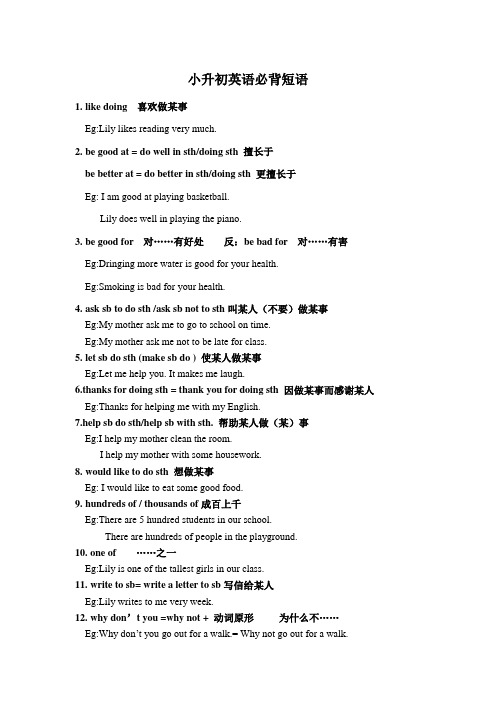
小升初英语必背短语1.like doing 喜欢做某事Eg:Lily likes reading very much.2.be good at = do well in sth/doing sth 擅长于be better at = do better in sth/doing sth 更擅长于Eg: I am good at playing basketball.Lily does well in playing the piano.3.be good for 对……有好处反:be bad for 对……有害Eg:Dringing more water is good for your health.Eg:Smoking is bad for your health.4.ask sb to do sth /ask sb not to sth叫某人(不要)做某事Eg:My mother ask me to go to school on time.Eg:My mother ask me not to be late for class.5.let sb do sth (make sb do ) 使某人做某事Eg:Let me help you. It makes me laugh.6.thanks for doing sth = thank you for doing sth 因做某事而感谢某人Eg:Thanks for helping me with my English.7.help sb do sth/help sb with sth. 帮助某人做(某)事Eg:I help my mother clean the room.I help my mother with some housework.8.would like to do sth 想做某事Eg: I would like to eat some good food.9.hundreds of / thousands of成百上千Eg:There are 5 hundred students in our school.There are hundreds of people in the playground.10.one of ……之一Eg:Lily is one of the tallest girls in our class.11.write to sb= write a letter to sb写信给某人Eg:Lily writes to me very week.12.why don’t you =why not + 动词原形为什么不……Eg:Why don’t you go out for a walk.= Why not go out for a walk.13.something important 一些重要的事情不定代词+形容词14.it’s time to do sth= it’s time for sth.是时候做某事了Eg:It’s time to have lunch.= It’s time for lunch.15.be like问性格,look like 问外貌be like 范围更大一些,有时候既问性格也问外貌Eg:What's your sister like? 你姐姐怎么样?/你姐姐是怎样一个人?She is kind. 她很善良。
小升初英语必备,语法精炼,考点大全

be 动词的用法口诀单数名词用 is,复数名词全用 are变疑问,往前提,句末问号莫丢弃变否定,更容易,be 后 not 莫忘记口诀解析1.我用 am,你用are,is 连着他/她/它I am a teacher. 我是一名老师。
You are a teacher. 你是一名老师。
He is a teacher. 他是一名老师。
2.单数名词用is,复数名词全用areThis is a book. 这是一本书。
These are books. 这些是书。
3.变疑问,往前提,句末问号莫丢弃Are you a student? 你是学生吗?4.变否定,更容易,be 后 not 莫忘记I am not a student. 我不是学生。
时间名词前所用介词的速记歌年月周前要用 in,日子前面却不行遇到几号要用 on,上午下午还是 in要说某日上下午,用 on 换 in 才能行午夜黄昏用 at,黎明用它也不错at 用在时分前,说差需要用上 to说过只可用 past,多说多练牢牢记口诀解析1.年月周前要用in,日子前面却不行in2022 在2022年in August 在八月in a week 在一周内2.遇到几号要用on,上午下午又是inon May 10th 在5月10日in the afternoon 在下午3.要说某日上下午,用on 换in 才能行on Monday morning 在周一的早上4.午夜黄昏用at,黎明用它也不错at midnight 在午夜at sunset 在黄昏at dawn 在黎明5.at 用在时分前,说差需要用上toat six 在六点ten to nine 八点五十(九点差十分)6.说过只可用past,多说多练牢牢记half past two 两点半可数名词的复数变化规律名词复数有规律,一般词尾加-s辅音字母+y 结尾,变y 为i 加-ess,x,sh,ch 结尾真有趣,末尾要加-es f/fe 真小气,字母v 来把它替,-es 在后别忘记字母o 也神奇,有生命加-es,没有生命加-s中日好友来聚会,绵羊、鹿、鱼带回家男士、女士 a 变e牙齿、双脚o 变双e口诀解析1.名词复数有规律,一般词尾加-sapple ——apple s2.辅音字母 +y 结尾,变y 为i 加 -esbaby —— bab ies3.s,x,sh,ch 结尾真有趣,末尾要加-esbox ——box esbrush ——brush es4.f/fe 真小气,字母v 来把它替,-es 在后别忘记leaf —— lea vesknife ——kni ves5.字母 o 也够神奇,有生命加-es,没有生命加-s tomato ——tomato eszoo ——zoo s6.中日好友来聚会,绵羊、鹿、鱼带回家Chinese/Japanese/deer/fish/sheep 单复同形7.男士、女士 a 变eman ——m e nwoman ——wom e n8.牙齿、双脚o 变双efoot —— f ee ttooth ——t ee th-f/-fe结尾名词复数变化妻子持刀去宰狼,小偷吓得发了慌躲在架后保己命,半片树叶遮目光口诀解析以-fe/-f结尾的名词有:wife 妻子、knife 刀子、wolf 狼、thief 小偷、shelf 架子、self 自己、life 生命、half 一半、leaf 树叶。
小升初英语重点知识点总结

小升初英语重点知识点总结一、否定句:表示其中一否定意思。
句中一定有not。
有三种可能:be动词(am、is、are、was、were)+not、情态动词(can、must、should)+ not、助动词(do、does、did) + not 如何将一个肯定的陈述句改为否定句:1、看句中有无be动词,如有,直接在be动词后+ not。
2、看句中有无情态动词,如有,直接在情态动词后+ not。
3、如上述二者都没有,就应用助动词+ not。
分四个步骤:(1)肯定陈述句中本来是没有助动词的,要加上去,位置在主语(人或物)后,动词前。
(2)确定助动词用do、does还是did,根据句中动词,动词是原形的助动词就用do,动词是第三人称单数的助动词就用does,动词用过去式的助动词就有did。
(3)在助动词后加not。
(4)原句中动词假如发生变化就要恢复成原形。
强调一点,有some的要考虑是否要用any。
二、一般疑问句。
表示疑问,一般回答只有两种可能Yes,……或No,……句中没有疑问词。
如何将一个肯定的陈述句改为否定句:1、看句中有无be动词,如有,把be动词提到句首即可。
2、看句中有无情态动词,如有,把情态动词提到句首即可。
3、如上述二者都没有,就应把助动提到句首。
分四个步骤:(1)肯定陈述句中本来是没有助动词的,要加上去,位置在主语(人或物)后,动词前。
(2)确定助动词用do、does还是did,根据句中动词,动词是原形的助动词就用do,动词是第三人称单数的助动词就用does,动词用过去式的助动词就有did。
(3)把助动词后提到句首。
(4)原句中动词假如发生变化就要恢复成原形。
强调一点,有some的要考虑是否要用any。
三、特殊疑问句。
表示疑问,有疑问词(在开头),回答有很多种可能。
常用疑问词:What、When、Which、Who、Whose、Why、How如何对划线部分提问:1、将原问句翻译为汉语(在读中要将划线部分重读)。
- 1、下载文档前请自行甄别文档内容的完整性,平台不提供额外的编辑、内容补充、找答案等附加服务。
- 2、"仅部分预览"的文档,不可在线预览部分如存在完整性等问题,可反馈申请退款(可完整预览的文档不适用该条件!)。
- 3、如文档侵犯您的权益,请联系客服反馈,我们会尽快为您处理(人工客服工作时间:9:00-18:30)。
小升初必备重点句型1. allow sb to do sth 允许某人去做某事(后接动词不定式)My father allowed me to go out for a walk after finishing my homework.2. asked sb (not) to do sth 叫某人做事某事(叫某人不要去做某事)My father asked me to study hard.He asked me not to swim alone.be asked to do sth 被叫去做某事/被邀请去做某事I was asked to have a dinner with them yesterday.3. be afraid to do sth 害怕做某事She is afraid to ask me questions.4. be afaid of doing sth 害怕做某事I am afraid of going out at night.5. be afaid of sth 害怕某物He is afraid of snakes.6. be amazed to do sth 对做某事感到惊讶He was amazed to meet the girl there.be amazed at sth 对某事感到惊讶they were amazed at the news.7. be busy doing/with sth 忙于做某事(常考)I was busy washing my car at that time. 那时候我正忙于清洗我的车子。
I am busy with my work.8. be coming/going/leaving/fiying/moving/dying(某些位移动词用进行时态时表将来)the bus is coming/the dog is dying.9. be excited to do sth 对做……感到兴奋Jacky was excited to travel there by plane.be excited at sthLily was excited at his words.be excited about doing sthhe was excited about passing the exam without going overing books.10. be frightened to do sth 害怕去做某事Sam is frightened to ride a horse.11.be glad/happy to do sth 高兴去做某事she is happy to clean the blackboard with me.be pleased to do sth高兴做某事she was pleased to help the old man yesterday.be pleased with sth 对某事感到高兴/满意the teacher was pleased with my answer.12.be interested in sth/doing sth 对某事感兴趣/对做某事感兴趣she is interested in swimming in the river.My btother is interested in Chinese.13. be/get ready for/to do sthBe ready for sth 为某事做好了准备We are ready for the exam.Be ready to do sth 为做某事做好了准备We are ready to have a birthday party for her.get ready for sth为某事在做准备We are getting ready for the exam.get ready for sth 为做某事而做准备13. be sorry to do sth 对做某事感到抱歉14. be surprised to do sth 对做某事感到惊奇be surprised at sth 对某事感到惊奇15. be worth doing sth 值得做某事(worth 后接动词-ing形式,常考)16. 开始去做某事begin to do sthbegin/start to do/doing sth17. can/be able to afford (to buy) sth 有能力购买(供)……18. can/may/must do sth could/would/should/might do sth19. can't wait to do sth 迫不急待地去做某事20. decide to do sth 决定去做某事make up one's mind to do sth 下决心去做某事(常考)make a decision to do sth 对做某事作出决定21. deserve to do sth 值得/应该做……22. encourage sb to do sth 鼓励某人去做某事23. enjoy doing sth 乐意去做某事24. expect (sb) to do sth 期望去做某事25. fail to do sth 做某事失败succeed doing sth 成功做了某事26. finish doing sth 做完某事(后接动词-ing形式)(常考)27. follow sb to do sth 跟随某人去做某事28. 让某人做某事(后接动词原形)get sb to do sthmake sb do sthlet sb do sth29. get/have a chance to do sth 得到一个做某事的机会30. give/pass/show/lend/sell sb sth/sth to sbbuy/get/bring sb sth/sth for sb31. go on to do sth 继续做事(常考)go on doing sth 继续做事(常考)32. hate to do/doing sth 讨厌/不喜欢做某事33. have fun doing sth34. have problems doing sth 做某事遇到困难35. 让某人做某事(后接动词原形)have sb do sthhave sth donehave sth to do 工有事要做36. hear sb do sth 听到某人做某事(后接动词原形,常考)hear sb doing sth 听到某人正在做某事(常见)37. help to do sth 帮忙做某事help sb (to) do sth 帮助某人做某事38. hope/wish to do sth 希望做某事wish sb to do sth 希望某人做某事39. I t seems that 这像是……(后接从句)seem to do sthseem +adj40. It's + adj+(for sb) to do sth .It's+adj +(of sb) to do sthIt's glad for him to hear the news.41. It takes sb some time/money to do sth . 花费某人多长时间做某事(常考)42. pay …for… cost spend…on…..it take …to do sth43. It's best for sb to do sth. 对某人来说做某事是最好的had better do sth 最好做某事(注意had没有时态和人称的变化,better后接动词原形)44. It's time for sb to do sth 是某人做某事的时候了45. keep (on)doing sth 坚持做某事(常考)keep sb doing sth 让某人做某事(常考)keep sb from doing sth 阻止某人做某事(常考)keep sb/sth +adjkeep the book for 2 days 借这本书两天(不要用borrow或lend)46. learn to do sth 学做某事learn sth from sb 向某人学习47. like to do/doing sth 喜欢做某事like sb to do sth 喜欢某人做某事48. need to do sth 需要做某事need doing sth/to be doneneed sth needn't do sth49. prefer to do sth rather than do sth 宁愿……而不愿……(常考)prefer doing sth to doing sth 喜欢做……胜过做……I prefer reading books to going shopping. 比起购物来,我更爱读书。
prefer to do sth 喜欢(爱)做某事50. refuse to do sth 拒绝做……51.(常考)remember/forget to do sth 记得/忘记做某事remember/forget doing sth 记得/忘记做过某事52. see sb do sth 看见某人做某事(结果)see sb doing sth 看见某人正在做某事(正在进行中)be seen to do sth 做某事被看见53. something to eat/drink 一些吃/喝的东西(词不定式放在something等后修饰这些词)I need something to eat. 我要一些吃的东西。
54. spend some time (in)doing sth /on sth 花费时间做某事(注意动词要用ing形式)(常考)spend some money on sth/doing sth 买……花了多少钱55. Sth is hard/difficult/easy to do . 做好某事很难/容易56. stop to do sth 停下来去某事(两件事)(常考)stop doing sth 停止做某事(一件事)(常考)stop sb (from) doing sth 阻止某人做某事(常考)57. take turns to do sth 轮流做……58. tell sb (not) to do sth 叫某人去(不要)做某事be told to do sth 被告知不要做某事59. There is no need (for sb) to do sth 对某人来说没必要做某事60. There is no time (for sb ) to do sthhave no time to do sth 没时间做某事61. too…(for sb) to …太……以致不能……so… that…not… enough to do The boy is too young to go to school. 那男孩太小了以致不能上学。
